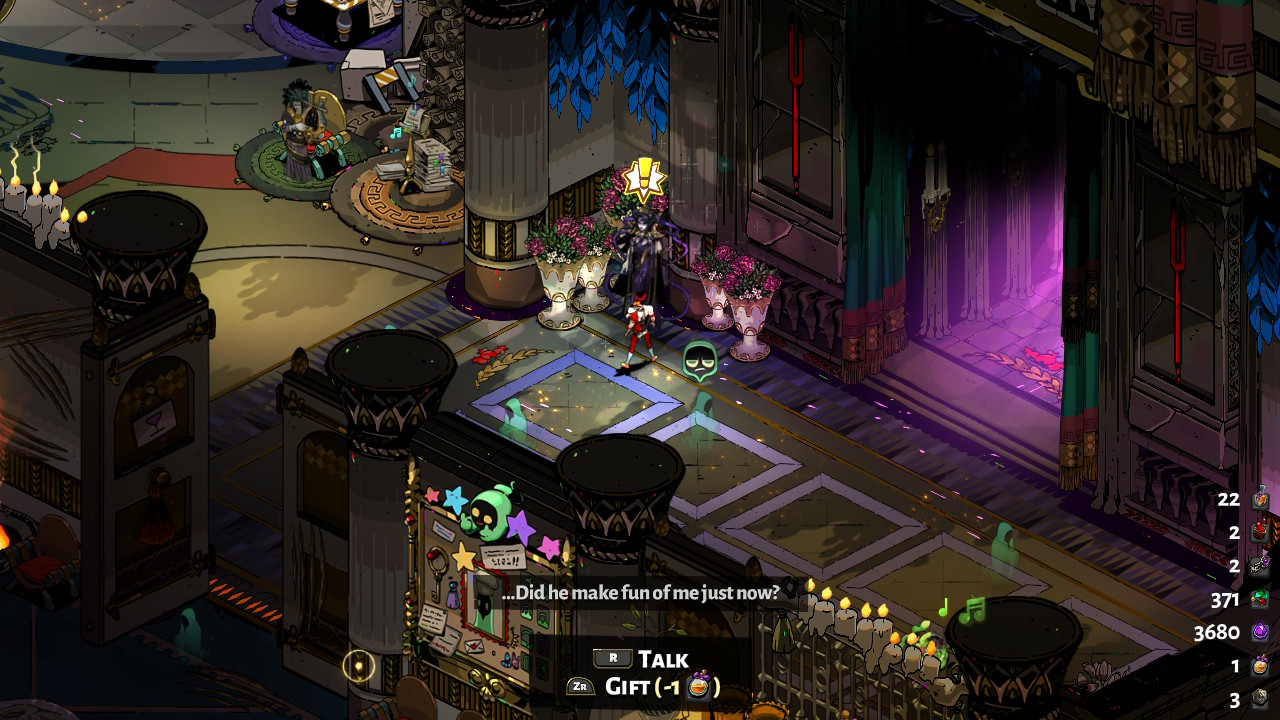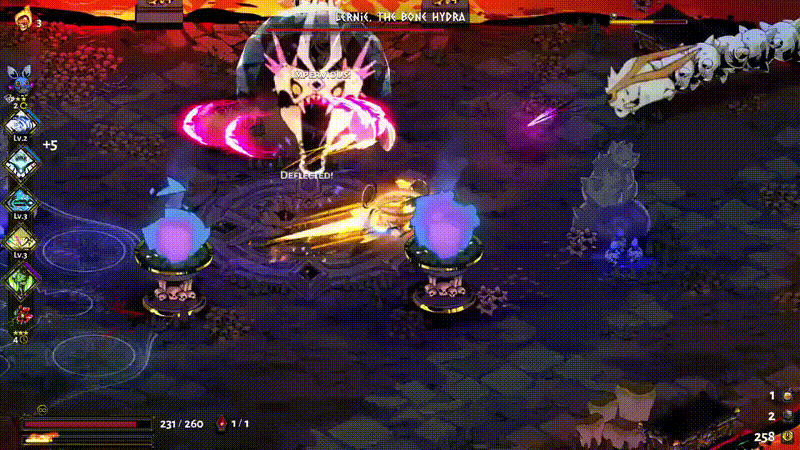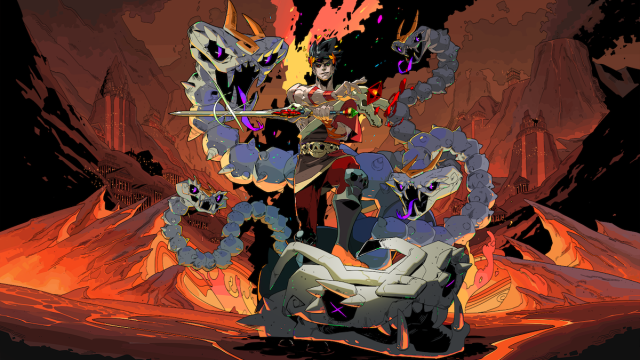Hades, the Greek mythology-themed action-roguelike from Supergiant Games, ostensibly gives you six weapons to play with. Beyond that, each one has four “aspects,” or weapon-altering forms. But you’ll only have access to three for each at the start.
For all intents and purposes, these individual aspects function as different weapons. A particular bow aspect might automatically target an enemy, for instance. A version of the fists might magnetically pull foes toward you. It’s not exactly game-changing stuff, but it certainly helps shake your runs up. You can unlock these extra aspects in Skelly’s chamber, right before you start each run, by forking over some hard-earned Titan’s Blood. But you might notice that the fourth and final one is shrouded for each. Given the arcane nature of how Hades works, you wouldn’t be wrong to wonder: How in the Hades do I get that last aspect?
This post has been retimed following the PS5/Xbox Series X & S launch of Hades.
Minor spoilers for Hades follow.
The simple answer, as with many things Hades, is that it’ll happen in due time. Like the River Lethe, Hades pushes forward unceasingly. But there are ways to speed up the process — chiefly, by learning secret phrases from various denizens of the Underworld and then repeating them to your semi-sentient weapons. (Don’t worry: Zagreus will do the memorising and the speaking for you.)
First, you need to purchase the Fated List of Minor prophecies from the House Contractor. If you haven’t already done so, seriously, what’s stopping you? It’s cheap (20 gemstones) and also opens up an expansive list of optional objectives, all of which will in turn line your coffers with even more currency. There’s also a good chance you’ll need to beat the game at least once. I didn’t uncover a single hidden aspect until after I completed my first run. Same for everyone I’ve spoken to about the game. But some folks on social media suggest that you need only reach the final boss, not beat it.
[referenced id=”1182339″ url=”https://www.kotaku.com.au/2020/09/everything-you-need-to-know-to-beat-hades-for-the-first-time/” thumb=”https://www.gizmodo.com.au/wp-content/uploads/sites/3/2020/09/23/cwcgxtdrkyoizfatwxnr-300×169.jpg” title=”Everything You Need To Know To Beat Hades (For The First Time)” excerpt=”If you haven’t cleared a run in Hades, you’re not alone. Supergiant’s Greek-themed roguelike is many things, but “easy” sure isn’t one of them. Beating the game the first time will happen eventually, but the following advice should help you speed up the process.”]
From there, you’ll need to have unlocked five extra aspects across the six weapons in your armory; sorry, the standard Aspect of Zagreus that comes with each weapon doesn’t count. Once that’s squared, just talk to Achilles over and over and over again until, eventually, he gives you the secret phrase for Varatha, the Eternal Spear. Interact with the spear before your next run and you’ll reveal the Aspect of Guan Yu. (Of note: You needn’t unlock it before revealing the other five aspects. You just need to reveal it.)
To reveal the final five aspects, you’ll first need to invest five Titan’s Blood into the weapon you want to uncover an aspect for, whether that means levelling up the Aspect of Zagreus a bit or unlocking and levelling up the other two aspects available. Then you’re more or less at the whims of the gods of random number generation. You just need to repeatedly talk to the following people during your runs until the hidden phrase comes up in conversation:
- Stygian Blade, Aspect of Arthur: Nyx
- Shield of Chaos, Aspect of Beowulf: Chaos
- Heart-Seeking Bow, Aspect of Rama: Artemis
- Twin Fists of Malphon, Aspect of Gilgamesh: Asterius
- Adamant Rail, Aspect of Lucifer: Zeus

For Artemis and Zeus, you can equip their keepsakes — the Adamant Arrowhead and Thunder Signet, respectively — at the start of each run to ensure you run into them early on. Nyx is a constant presence in the House of Hades, so you can talk to her whenever you want. But Chaos, meanwhile, is a fickle little primordial omniscient monster. Chaos does what Chaos wants. Can’t help you there.
Asterius is a bit trickier than those four. As you’re making your way through Elysium, keep an eye out for chamber rewards that have a skull on the bottom of the bubble. Those indicate a tougher battle, and there’s a chance you can face the Bull of Minos in one-on-one combat. (As a bonus: Defeating him will slash his health significantly for Elysium’s final boss battle.) I took him on with the Twin Fists of Malphon and he made some foreshadowing comment about destiny or fate or whatever. The next time I fought him, sans fists, he gave me the phrase.

This might all sound like a slog worthy of a certain boulder-pusher, but, if you’re a fan of the game, it’s well worth the effort to see it through. Whether or not these hidden aspects are good is a matter of opinion and playstyle. What’s certain is that, unlike the three initial aspects, they’re significantly game-changing. The sword’s Aspect of Arthur, for instance, can create an area that slows down any enemy that enters it. The Aspect of Lucifer turns Exagryph into a laser gun that can fire motion-sensing, damage-radiating explosives. These variations force you to approach runs creatively from both strategic (“OK, what boons are now best with this weapon?”) and tactical (“OK, how should I use this new move against the Hydra?”) perspectives.
There’s also a narrative impetus to unlock this stuff. Arthur, Beowulf, Gilgamesh — you may have noted that each aspect is tied to a legend unaffiliated with Greek mythology. Characters will remark on this. No one’s heard of this Lucifer fellow, but apparently he had a fight with his dad? Whatever the case, everyone’s sure that he, alongside all of those other unknown legends, is a tough customer, worthy of wielding one of the Infernal Arms.
It’s another neat plot device in a game already chock-full of them. Play Hades all you want for the (really, really good) action, but for me the narrative is the main draw. And the best stories — from Eurydice and Orpheus to Achilles and [redacted] — in Hades are those in the margins. You won’t experience all of them without unlocking these final aspects. That alone is worth fighting your way out of hell, however many times you need to.
More dispatches from the underworld
[referenced id=”1185720″ url=”https://www.kotaku.com.au/2020/10/hades-the-kotaku-review/” thumb=”https://www.gizmodo.com.au/wp-content/uploads/sites/3/2020/10/01/hades-review-300×164.png” title=”Hades: The Kotaku Review” excerpt=”Hades is my game of the year. It’s also the game of the year. I don’t mean to say that Hades is objectively the best, because that’s an impossible metric (and also Baldur’s Gate 3 isn’t out yet). Rather, developer Supergiant’s Greek mythology-flavored action roguelike is, improbably, the game that…”]
[referenced id=”1185543″ url=”https://www.kotaku.com.au/2020/09/what-your-favourite-hades-weapon-says-about-you/” thumb=”https://www.gizmodo.com.au/wp-content/uploads/sites/3/2020/09/30/grtv0gv54hskxwoxpddq-300×169.jpg” title=”What Your Favourite Hades Weapon Says About You” excerpt=”In Hades, each Infernal Arm you use to escape from Hell has its own unique abilities. The different weapons — combined with the various perks and god-given boons you can choose and the artifacts you can equip — ensure no two escape attempts are quite the same. Like the gods,…”]
[referenced id=”1185895″ url=”https://www.kotaku.com.au/2020/10/everything-you-need-to-know-about-hades-endgame/” thumb=”https://www.gizmodo.com.au/wp-content/uploads/sites/3/2020/10/02/mracynsi9wd5boclqjmq-300×169.jpg” title=”Everything You Need To Know About Hades’ Endgame” excerpt=”Hades doesn’t really start until you beat it. In many roguelikes, you’re encouraged to play through the game ad infinitum. Hades is no different. Once you beat the final boss (well, for the first time), a new gameplay mechanic opens up, and the game fundamentally changes.”]

Leave a Reply